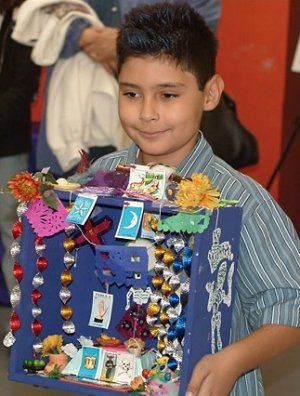Nestle reaches out to Latino youth with Day of the Dead themed activities
Posted by Elena del Valle on October 18, 2007

One of the winners of the 2005 altar-building contest in Los Angeles
Photo: Wonka
While Jack-o-lanterns, skeletons and broomsticks adorn the doors and windows of some homes, community centers, schools, museums and arts organizations, in the Mexican-American community, the décor is slightly different, with traditional and personal touches. Some build Día de los Muertos (Day of the Dead) altars in honor of departed relatives, musicians, artists, cultural heroes or leaders. The altars, designed to celebrate a person’s life and contributions to their family or community, may feature favorite belongings of the deceased, sugar skulls and sweets.
In an effort to target Latino youth, Nestlé launched the Wonka Arte program in 2005 with free workshops in Los Angeles to teach kids how to build altars. Wonka partnered with Plaza de la Raza, a community based arts organization in Los Angeles, to offer workshops, a contest and an awards ceremony. This year, the program extended its reach to retail locations and the online world. Still in partnership with Plaza de la Raza, the Wonka sponsored program includes a contest for the best altars, an online sweepstakes and free sugar skull building workshops for children at retail locations.
Wonka.com’s new interactive features allow kids to learn about the Day of the Dead while showing off their altar-building talents in the virtual world for a chance to win prizes. Children are invited to build altars online incorporating virtual Wonka candy and representations of traditional Day of the Dead components such as sugar skulls and cempasuchil (marigold) flowers.
“Latino Family Dynamics” audio recording


Brenda Hurley and Liria Barbosa
Discuss
- Latino purchasing habits and products they favor
- Latino family characteristics
- Latinos and extended families
- Division of duties, responsibilities within the family
- Who is the decision maker in the Latino family
- Who is the information provider in the Latino family
Click here to find out about Latino purchasing habits and “Latino Family Dynamics”
“We understand the importance of the Day of the Dead holiday to Hispanic youth and their families,” said Elizabeth Vanemburg, marketing manager of Wonka. “We want to encourage kids to observe, learn more about the holiday and participate in the altar-building tradition on Wonka.com. No experience is necessary. All you need is a bit of imagination and access to a computer.”
Children 16 and younger can submit their online altar for a chance to win a laptop computer, mp3 player and a $100 gift card to download music, as well as $120 toward Internet access.
Promotional efforts to inform parents and children about the online portion of the program include a press release, fliers and online advertising. The public relations team is also using calendar and public service announcements, press releases and media alerts to inform Los Angeles residents about the workshop, contest and ceremony.
Día de los Muertos is a Pre-Columbian holiday traditionally observed in Mexico November 1 and 2 to honor loved ones who have passed away by celebrating their lives. According to the Wonka website, some believe the departed join the living during those days to celebrate together. The celebration involves making homemade altars with items that brought happiness to the departed individual. Sugar skulls, candies, photographs, papel picado, candles, incense, and marigold flowers often decorate the altars. Some altars have evolved to include celebrities, musicians, artists, and even pets.
Nestlé USA sells food products and candy including Wonka, Sweetarts, Nerds, and Runts to name a few. Nestlé USA had sales of $8.5 billion in 2006. Its parent company is Nestlé S.A. of Vevey, Switzerland, one of the world’s largest food companies with sales of $79 billion.









